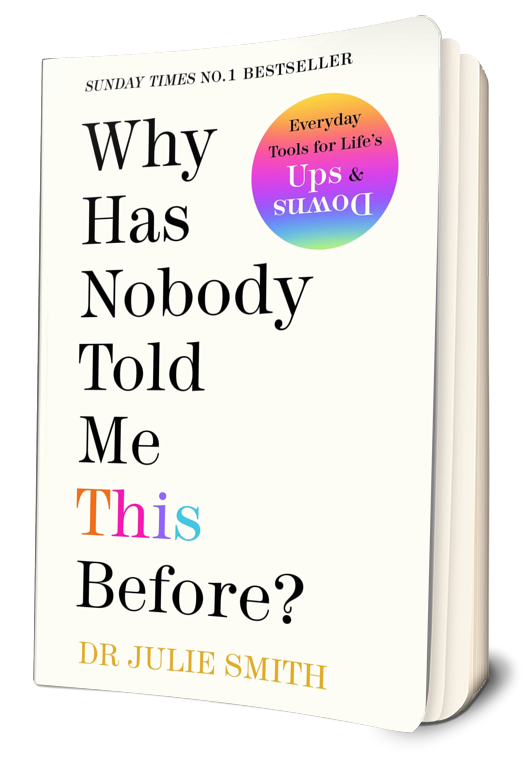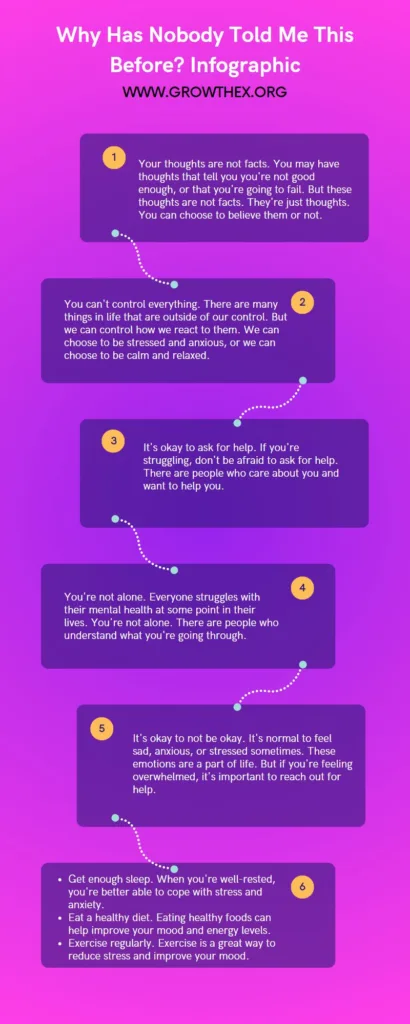Why Has Nobody Told Me This Before? is a compilation of a clinical psychologist’s most effective suggestions for overcoming anxiety and depression and enhancing our mental health gradually, drawn from more than ten years of one-on-one work with patients.

Do you ever experience sudden anxiety? I do. I make a lot of to-do lists to organise different elements of my life, and for the most part, it helps. But occasionally, when I consider all these various lists and the numerous items they include, I am paralysed. There’s a lot to do! When will I complete everything?
I’m not the only one who has this happen to me, but according to Dr. Julie Smith, the onset of worry and other unfavourable emotions never comes suddenly; it simply feels that way. Smith was the first licensed psychologist to use TikTok to convey what she had discovered while working in the field.
She has amassed over four million followers in just three short years, and in 2022, she produced a book containing her best tips.
Why hadn’t someone told me this earlier? addressing subjects like despair, inspiration, grief, fear, tension, and meaningful living, it quickly became a bestseller. The book softly demonstrates for us in small steps how to reclaim, enhance, and preserve our mental health.
Identify the unmet requirements that are causing your emotions by asking yourself questions, and then deal with those needs immediately.
Emotions are not something that just magically appears. Emotions must have a source, just like a river. They invariably emerge from unfulfilled demands, says Dr. Smith. As a result, if we wish to effectively manage our emotions, we must recognise and meet those demands. Consequently, the feelings will subside.
For instance, it makes sense that you would be grouchy in the morning if you overate at dinner, experienced dry mouth at night, and only got six hours of sleep the night before. Nevertheless, our emotions always have a source, even if it’s not a clear biological deficiency. For instance, my sudden concern over my to-do list could be caused by my feeling like I haven’t accomplished enough for the day.
“Feelings aren’t just in your head,” Dr. Smith asserts. They can originate from within your body, the condition of your home, your current situation, previous events, and of course the people you deal with. Smith suggests asking yourself a few questions and perhaps even regularly journaling about them in order to uncover your unfulfilled needs:
What exactly goes through your mind when a bad mood strikes?
When do these ideas typically come to mind?
What environment?
Do you have any additional bodily symptoms in addition to your negative mood?
What did you do over the past few days that caused you to feel unwell?
Learn more by asking questions. Find the unmet needs underlying your feelings and deal with them head-on. Going to the source of your emotions will help you handle them more gracefully, even if you decide not to do anything about them in some situations.
To stop yourself from spiraling into a foul mood, make “good enough” decisions.
Bad moods are problematic because they like to linger. After work, we’re weary, so we eat half a bag of chips, only to regret it later, which increases the likelihood that we’ll grab for another emotional band-aid.
Dr. Smith claims that the key to breaking out of such a spiral is to decide that “good enough” is the best course of action rather than seeking perfection from yourself. We can advance in the right path without creating unreal expectations when we make “good enough” judgements. They therefore assist us in gaining confidence while not overpowering us.
In relation to my worry over my to-do lists, I can just say, “This project is important right now, so let me tick off one item here and go from there,” as opposed to promising to accomplish every item on one of my lists. You may try brewing yourself a cup of tea to relax and stop eating chips nonstop. Even better, according to Smith, develop the practise of sipping tea as soon as you get home from work!
Making “good enough” judgements is not meant to be a quick fix for all of our issues. It does this by demonstrating that change is feasible, encouraging us to continue in the right direction, and helping us establish better habits that will eventually allow us to function automatically.
To overcome unexpected anxiety attacks, practise “square breathing” before continuing step-by-step.
Anxiety is frequently a more persistent issue, in contrast to a foggy morning that may be remedied with some coffee. We’ll have to handle it gradually. Dr. Smith cites the example of a person who, after the epidemic, started to avoid going to the store, taking the bus, and eventually stopped leaving the house altogether because they felt uneasy in large crowds. How is that individual supposed to return to normal? Smith says, “In small steps.” First, try the grocery store. Next, board a train. so forth.
But what if, on your first day “back to reality,” you find yourself frozen to a halt in front of the pinto bean shelf? Smith also suggests square breathing as a practical method for such. This is how it goes:
- Find a square object. anything has four corners. Your wallet, a window, or a cereal box might be the culprit.
- Inhale deeply as you gaze at the bottom left corner.
- Slowly shift your gaze to the top left corner after counting to four.
- For four seconds, hold your breath as you make your way to the upper right corner.
- As you make your way to the bottom right corner, exhale while counting to four.
- Return to the bottom left corner and take a deep breath.
- “Courage comes before confidence,” explains Dr. Smith. Build it up gradually and attempt “square breathing” if you ever notice yourself becoming anxious.
If you really like this “Why Has Nobody Told Me This Before Book Summary” by Growthex then you can also check out some more amazing posts | summaries which are freely available on this platform :
